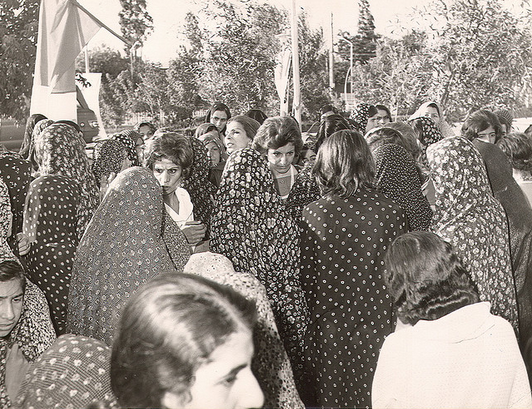 Mahnaz returned to Iran in 1967 as a professor of literature at the National University of Iran, where she and her women students faced the challenge of negotiating their demand for independence, autonomy, and agency within a male-dominated culture and religion.
Mahnaz returned to Iran in 1967 as a professor of literature at the National University of Iran, where she and her women students faced the challenge of negotiating their demand for independence, autonomy, and agency within a male-dominated culture and religion.
She worked with her students to found the Association of University Women and together they sought ways to define and demand rights while preserving their spiritual beliefs and their cultural values. Through the Association of University Women, Mahnaz was drawn into the women’s movement in her country and in a short time she became the secretary general of the fledgling Women’s Organization of Iran. Over a period of ten years, she worked with tens of thousands of women throughout the country to help discover and articulate women’s needs and priorities, arrive with them at a shared vision of rights, and map out an efficient strategy for a successful struggle. Navigating a difficult and tortuous terrain between the growing fundamentalist movement, the patriarchal government bureaucracy, and the aspirations of women who wished to achieve rights but did not wish to abandon their cultural and religious roots, they succeeded in putting women’s issues at the forefront of national concerns. Following a year of intense activism during International Women’s Year (1975), she was asked to join the cabinet and hold the newly created national-level post of Minister for Women’s Affairs—the second woman in the world to hold that position after Françoise Giroux of France and the first in the Muslim world. Using her new position, she helped enact legislation that refined and consolidated the achievements of the family laws of 1967. By 1978 women had gained equal rights to divorce, and the minimum age of marriage for girls was raised to protect the girl child from stunted emotional and physical growth and limited educational possibilities. Mahnaz initiated and sponsored a package of laws and regulations to support women’s employment that included extended paid maternity leave, part time work with full time benefits for mothers, and childcare on work premises. Mahnaz helped empower and expand a vast network of activist women’s groups that made possible the participation of women in the highest levels of decision-making and their presence in non-traditional fields of work, including the armed forces, the judiciary, the parliament, the cabinet, the diplomatic corps, as well as the spectrum of private professions. Read on: Revolution and Regression
